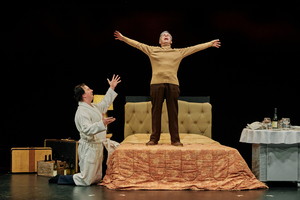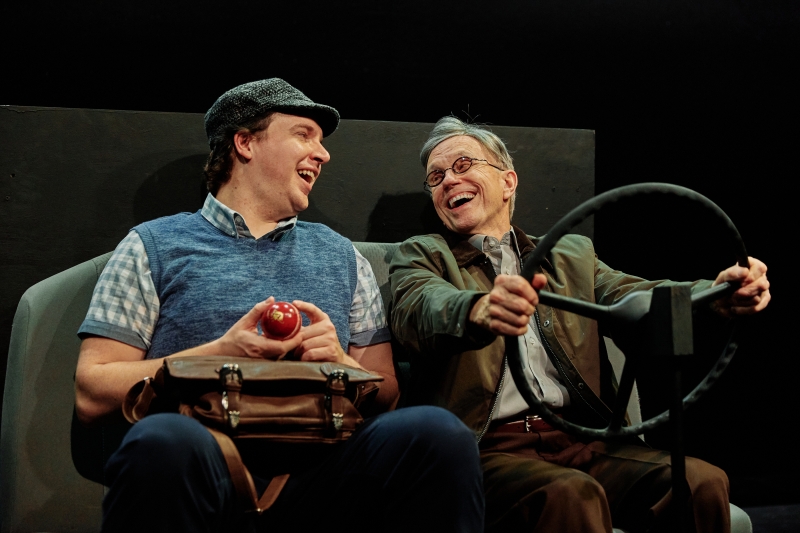Review: SAM AND DEDE, OR MY DINNER WITH ANDRE THE GIANT at Washington Stage Guild
The production runs until February 6th, 2022

Sam and Dede, or My Dinner with Andre the Giant is an honest show about a fictionalized truth. It explores the friendship between two famed artists, and their charming shared history. The premise involves Samuel Beckett, the Irish playwright and literary celebrity, living in rural France in the late 50's, giving his younger neighbors rides to the local school. Among these children was André René Roussimoff, the beloved wrestler and actor. While in reality their relationship most likely ended at the school door, Sam and Dede meanders in a world where the two are acquainted into André's adulthood.
The play is broken into six scenes, the first three taking place when André (played by Benjamin Russell) is a young schoolboy, taking rides from his neighbor, Sam (played by Alan Wade). While at first reluctant to ride with the stranger, André (or Dede, as he informs Sam), slowly opens up to the writer, and the two become a pair of odd friends. Throughout the opening of the show we see them grow closer, represented by Dede's openness to the rides, and his movement from the back of the truck, to the cab of it. A simple yet effective choice on part of the artistic team.
It is in these scenes where the philosophical meat of the play is set up. Dede expresses through words, tears, and his body, his discomfort with his size, and with his constant perception by others. He is ever present in public, seen by himself as some sort of freak, with never a reprieve from his anxieties as he speaks on his exponential and never ceasing growth. He will never stop taking up more and more space and this makes him embarrassed, ashamed, and shy. Sam in these scenes acts as a quiet mentor; lending an ear, and casually administering advice. He is patient and kind to Andre, he cracks jokes. They share a love of sport, particularly cricket, and bond over the excitement it brings them.
While these three scenes focus on Andre and his troubles, they also begin the whispers of existentialist thought focused on later in the show. Dede probes Sam about his writing, and is confused at the realization that Sam writes with what seems to be little to no intention or understanding of his own works. The first of the many "I don't know"s are uttered by Sam here. The show begins to explore what it means to be a writer, and what it means to create.
This part of the show featured a very sparse set, designed by Carl Gudenius and Jingwei Dai, consisting of a wheel and bench, suggesting a truck. The minimal spectacle was accompanied by convincing pantomimes, and meticulously timed audio cues. It is quite charming, and fitting for a show concerned with visibility and intention.
While the script suffers from some repetitive thought and dialogue in its opening, the actors executed the humor effectively and subtly; this was a show of smirks, and heavy breaths out the nose.
The fourth scene incorporates the first time jump in the show. The audience is taken to 1963, where the two share a reunion at a show of Beckett's play Endgame. While initially awkward, the two settle into their old routine of sprawling conversation. We see how the pair has grown, both literally and figuratively. André is a man now, with a man's job. He moved to Paris, and is a mover, though he is getting into wrestling. The costume changes were subtle, Benjamin lost his hat and vest, but quite effective with the actor's change of voice. While keeping the same accent, Russell dropped his voice several octaves, and did indeed sound quite like the Giant himself.
After a brief intermission the last two scenes were performed, being incredibly unique from one another. The fifth scene is where the essence of the show lies. It is by far the longest scene and where we get the biggest window into the characters' minds. It takes place in a hotel room after the titular dinner. The two share quite a bit of wine and contemplate their careers, their purpose, and their perception by the public. We dive into the main themes of the show, the main questions. How is a man who is ever expanding to relate to one who is ever evasive? What is it to be sure of something, and what is it to be sure of nothing, and are those perhaps the same? After multiple bottles of wine and a few wrestling demonstrations, Sam leaves, and the audience is left in a purgatory of contentment, and grasping, like Sam, for something that will not come.
Steven Carpenter's (the director) hand is heaviest here. With another sparse set and a long spread of dialogue, this part of the show had the most blocking. While not being too over the top, the actors moved around the hotel room, usually mirroring each other in some way, always keeping the balance. It was a good choice, anything less would have led to potential boredom on the audience's part, and anything more could've been uncharacteristic of the show.
The end of the piece is a total anomaly compared to anything preceding it. The two men are in urns, à la Beckett's Play, and speak over each other, then in turns, then simultaneously again. They recount what is assumedly their last meeting, and how they have changed each other throughout their odd friendship. It is quite surreal, and Marianne Meadows lighting design provided a liminal space for this scene to occupy. It is a fluid yet fulfilling end to the show, and one that leaves the viewer a little hopeful, a little curious, and reckoning with the meaning of art, showmanship, and visibility.
Russell gives two and a half performances in this show; both similar but separate. One is that of a child, one with trauma, one trying to escape to something else, reckoning with his mind and his body. The second is of a fully realized adult. Larger than life (in more than one way), and happy with his size, or at least surrendered to it. This is a man who knows who he is. Someone who can find joy despite living with pain. The second and a half performance is that of André in scene four where he is more than a boy but not quite a man; confident, but not very.
Where Russell and André's change is obvious, Wade and Sam give a more subtle performance. There is less change evident, there is no puberty, not epiphany. However throughout the implied time we see a man become more and more stoic in his unknowing spirit. Sam's character was comforting as he was thought provoking. The actor has a hard job with the show; quintessentially personifying imposter syndrome. It was difficult to watch someone grapple with that, but in a way Alan made it comforting. He made it universal. He had paternal and mentorial energy, conveyed in a very polite and thoughtful way. When he was smiling the audience was smiling. When he was perturbed or anxious, so was the audience.
The show itself is pretty accessible, however a little esoteric towards theatre fans, and in particular those who are fond of Beckett himself, as his work is semi-frequently referenced. Also with both these celebrities being deceased, and in the limelight some time ago the show is also less suited for younger audiences. Of course however, a small amount of research could remedy this.

Sam and Dede, was warm, intellectual and musing. It probes the viewer just as much as it probes the character, and perhaps leaves one with more questions than answers. The production is quite enjoyable, and a good show to see with friends, as one is sure to need to talk about what this piece presents.
Running Time: One Hour and 45 minutes with one intermission.
Washington Stage Guild's production of Sam and Dede, or My Dinner With André the Giant plays through February 6, 2022 in their Undercroft Theater. Viewers should be advised the show deals with themes of body dysmorphia. Tickets and more information are available on Washington Stage Guild's website at https://stageguild.org/buy-tickets/
Photo Credit: DJ Corey Photography
Reader Reviews

Videos

